- Home
- Quizzes
- My Quiz Activity
- Newsletters
- Sports Betting
- MY FAVORITES
- Add Sports/Teams
- SPORTS
-
NFL
- NFL Home
- Arizona Cardinals
- Atlanta Falcons
- Baltimore Ravens
- Buffalo Bills
- Carolina Panthers
- Chicago Bears
- Cincinnati Bengals
- Cleveland Browns
- Dallas Cowboys
- Denver Broncos
- Detroit Lions
- Green Bay Packers
- Houston Texans
- Indianapolis Colts
- Jacksonville Jaguars
- Kansas City Chiefs
- Las Vegas Raiders
- Los Angeles Chargers
- Los Angeles Rams
- Miami Dolphins
- Minnesota Vikings
- New England Patriots
- New Orleans Saints
- New York Jets
- New York Giants
- Philadelphia Eagles
- Pittsburgh Steelers
- San Francisco 49ers
- Seattle Seahawks
- Tampa Bay Buccaneers
- Tennessee Titans
- Washington Commanders
-
MLB
- MLB Home
- Arizona Diamondbacks
- Atlanta Braves
- Baltimore Orioles
- Boston Red Sox
- Chicago White Sox
- Chicago Cubs
- Cincinnati Reds
- Cleveland Guardians
- Colorado Rockies
- Detroit Tigers
- Houston Astros
- Kansas City Royals
- Los Angeles Angels
- Los Angeles Dodgers
- Miami Marlins
- Milwaukee Brewers
- Minnesota Twins
- New York Yankees
- New York Mets
- Oakland Athletics
- Philadelphia Phillies
- Pittsburgh Pirates
- San Diego Padres
- San Francisco Giants
- Seattle Mariners
- St. Louis Cardinals
- Tampa Bay Rays
- Texas Rangers
- Toronto Blue Jays
- Washington Nationals
-
NBA
- NBA Home
- Atlanta Hawks
- Boston Celtics
- Brooklyn Nets
- Charlotte Hornets
- Chicago Bulls
- Cleveland Cavaliers
- Dallas Mavericks
- Denver Nuggets
- Detroit Pistons
- Golden State Warriors
- Houston Rockets
- Indiana Pacers
- Los Angeles Clippers
- Los Angeles Lakers
- Memphis Grizzlies
- Miami Heat
- Milwaukee Bucks
- Minnesota Timberwolves
- New Orleans Pelicans
- New York Knicks
- Oklahoma City Thunder
- Orlando Magic
- Philadelphia 76ers
- Phoenix Suns
- Portland Trail Blazers
- Sacramento Kings
- San Antonio Spurs
- Toronto Raptors
- Utah Jazz
- Washington Wizards
-
NHL
- NHL Home
- Anaheim Ducks
- Arizona Coyotes
- Boston Bruins
- Buffalo Sabres
- Calgary Flames
- Carolina Hurricanes
- Chicago Blackhawks
- Colorado Avalanche
- Columbus Blue Jackets
- Dallas Stars
- Detroit Red Wings
- Edmonton Oilers
- Florida Panthers
- Los Angeles Kings
- Minnesota Wild
- Montreal Canadiens
- Nashville Predators
- New Jersey Devils
- New York Islanders
- New York Rangers
- Ottawa Senators
- Philadelphia Flyers
- Pittsburgh Penguins
- San Jose Sharks
- Seattle Kraken
- St. Louis Blues
- Tampa Bay Lightning
- Toronto Maple Leafs
- Vancouver Canucks
- Vegas Golden Knights
- Washington Capitals
- Winnipeg Jets
- NCAAF
- NCAAM
- Boxing
- Entertainment
- Lifestyle
- Golf
- MMA
- Soccer
- Tennis
- Wrestling
- More Sports
- RESOURCES
- My Account
- YB on Facebook
- YB on Twitter
- YB on Flipboard
- Contact Us
- Privacy Policy
- Terms of Service
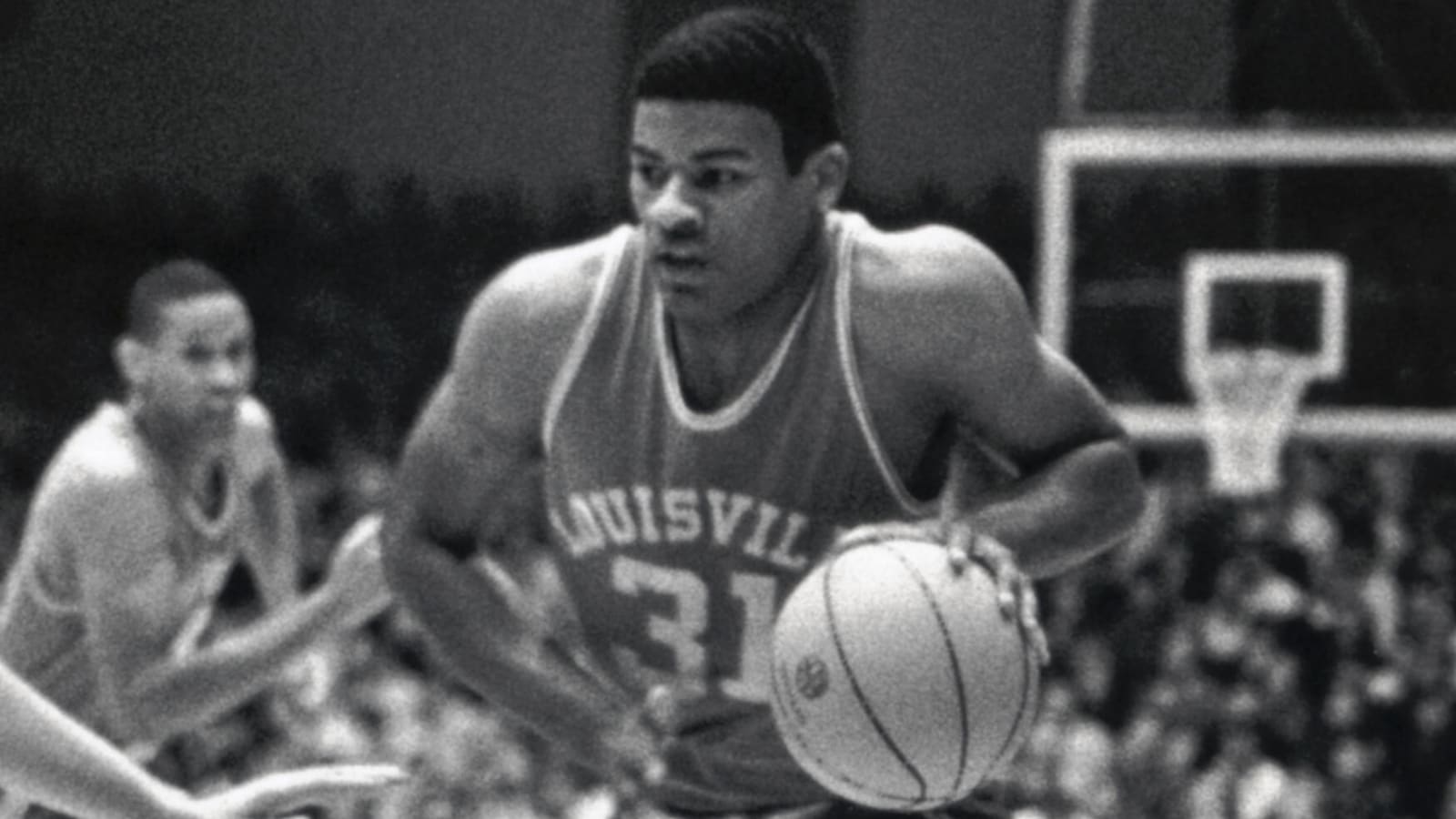
The greatest players in Louisville men's basketball history
Louisville has quite the basketball legacy. Legendary coaches "Peck" Hickman, Denny Crum, and, for better or worse, Rick Pitino. Memorable teams, and of course some of the greatest players college basketball has ever produced.
Here's our take on the 20 best players in the history of Louisville Cardinals men's basketball. Listed in chronological order.
Charlie Tyra, Forward (1954-57)
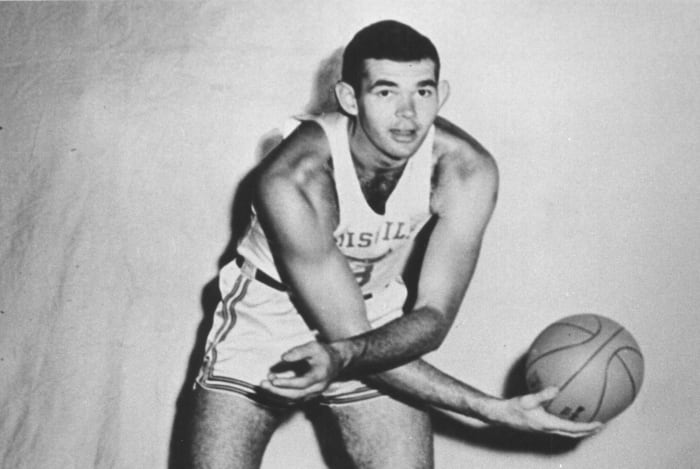
A Louisville native and city legend, Tyra was the program's first All-American (1956, '57) — and first star, for that matter. Tyra is still the school's all-time leader with 1,617 rebounds (which also ranks among the top 15 in NCAA history), and ranks within Louisville's top 10 in career rebounding average (17.0), made field goals (640), points (1,728) and scoring average (18.2). He helped the Cardinals win their first NIT title in 1956, when he averaged school records of 23.8 points and 22.2 rebounds. Tyra's No. 8 jersey is one of five retired by the school.
John Turner, Forward (1959-61)
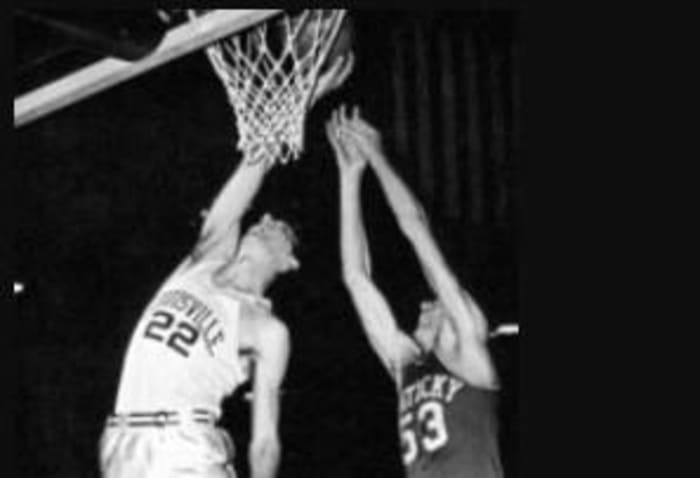
A couple of years after Charlie Tyra's dominance at Louisville came to an end, it was Turner's opportunity to shine. He helped the Cardinals reach their first Final Four in 1958-59, while averaging 14.0 points and 9.7 rebounds. Two seasons later, Turner averaged 23.1 points, which still ranks second in school history, and 11.4 rebounds. He earned All-American honors for that 1960-61 campaign. Taylor ranks ninth in school history with 919 career rebounds, and scored more than 1,400 points at Louisville, where he also sits among the top 10 at 16.9 points per game.
Wes Unseld, Center (1966-68)

There's an argument to be made that Unseld is the greatest basketball player ever to suit up at Louisville. He joins Charlie Tyra to have his No. 31 retired by the school. Unseld, a member of both the College Basketball and Naismith Memorial Basketball Hall of Fames, is the Cardinals' all-time average scoring leader at 20.6 points, and the two-time consensus All-American ranks 11th with 1,686 points. His 23.0 points per game in 1967-68 is the third-highest in school history for a season. The Louisville native's 18.9 career rebounds per game are also the most for a career by any Louisville player, and his 1,551 boards sit second.
Butch Beard, Guard (1967-69)
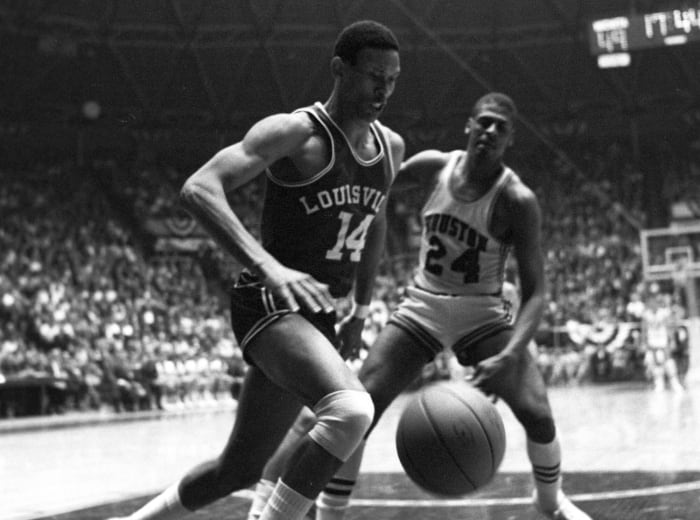
A roommate of Wes Unseld at Louisville, Beard scored nearly 1,600 career points during his three seasons with the Cardinals. His 19.0 career points-per-game average ranks second behind Unseld. Beard's 27 points against Georgetown College are the most by any Louisville player in a career debut. Beard averaged 20.5 points in his first collegiate season of 1966-67 and 20.6 two years later in his final campaign for the Cardinals. It was Beard's 1968-69 season for which he earned All-American honors. In addition, Beard was twice named an All-Missouri Valley Conference performer.
Jim Price, Guard (1970-72)
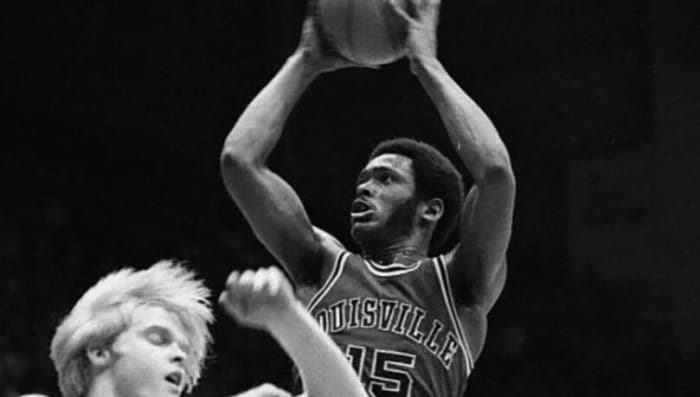
Price fell just shy of 1,500 points for his collegiate career. However, he did average 21.0 points on 49.5-percent shooting during the 1971-72 season, while helping the Cardinals reach the Final Four for the second time in school history. The Indianapolis product also earned All-American honors that season, and his 244 made field goals from that campaign are the fifth-most by a Cardinal. Price's 17.1 career scoring average also ranks sixth at Louisville. In addition. For his career, Price shot 46.4 percent, and also recorded 378 assists.
Junior Bridgeman, Forward (1973-75)
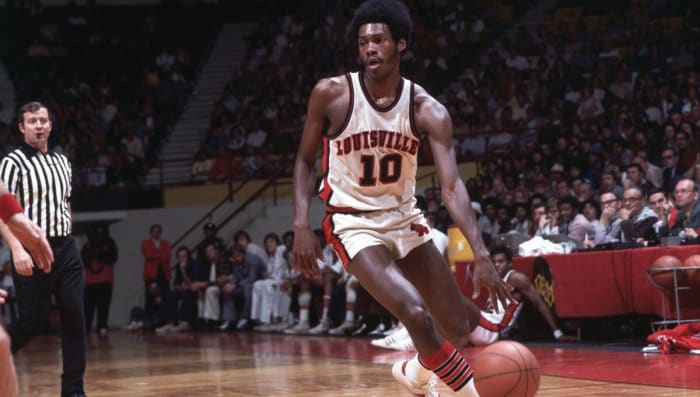
The pride of East Chicago, Ind., Bridgeman enjoyed success at every level of basketball he played. At Louisville, Bridgeman averaged 15.5 points, on an impressive 51.7-percent shooting, 7.6 rebounds and 2.7 assists for his three seasons. He was named Missouri Valley Conference Player of the Year in both 1974 and '75. The latter while helping Louisville reach the Final Four, and earn All-American recognition. Bridgeman went on to enjoy a stellar NBA career, where he scored more than 11,000 points and had his No. 2 retired by the Milwaukee Bucks.
Darrell Griffith, Guard (1977-80)
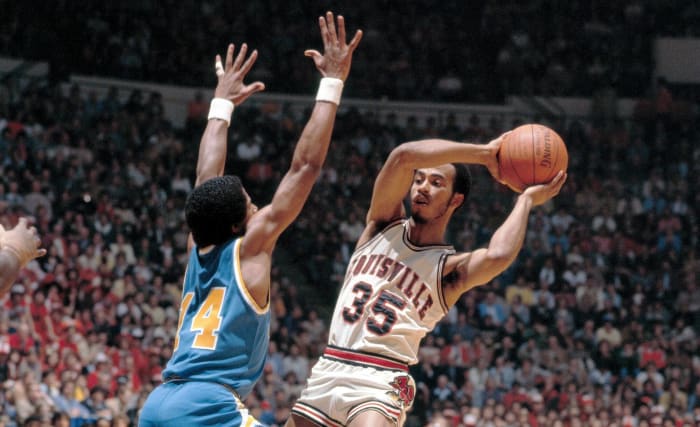
We noted Wes Unseld's argument for the greatest player in Louisville basketball history, but the traditional consensus seems to point at Griffith. And, why not? Another local Louisville product, not only is Griffith the school's all-time leading scorer with 2,333 points, he's beloved in these parts for leading the Cardinals to their first national championship in 1979-80. The Wooden Player of the Year Award winner that season, Griffith averaged 22.9 points on 55.3-percent shooting, plus 4.8 rebounds and 3.8 assists as the Cardinals finished 33-3. His 825 points from that season are still the most in school history, as are his 981 career made field goals. Griffith's No. 35 was retired by the program.
Derek Smith, Guard-Forward (1979-82)
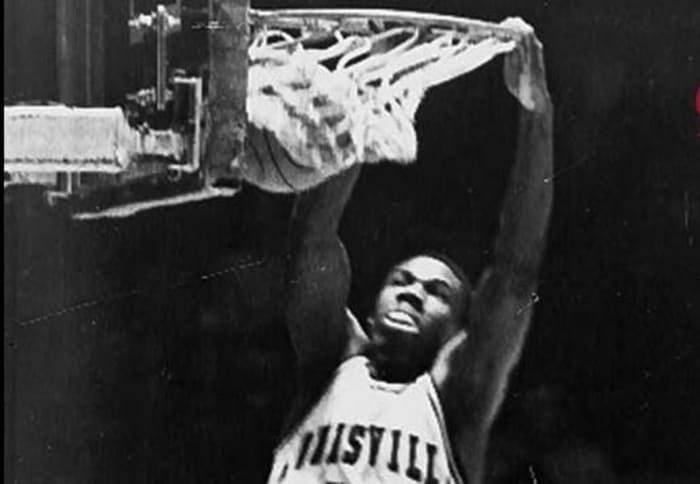
Another member of the Cardinals' 1980 national title group. That was a breakout sophomore season for Smith, who averaged 14.8 points, and shot 57.3 percent, while also pulling down 8.3 rebounds in 1979-80. However, Smith's entire collegiate career is worth celebrating. He ranks seventh in school history for points (1,826) and 10th in rebounding (884). He was the Metro Conference Player of the Year in 1980-81, while averaging 15.5 points, 7.8 boards and 2.5 assists. Smith played 131 games during his four seasons at Louisville.
Rodney McCray, Forward (1980-83)
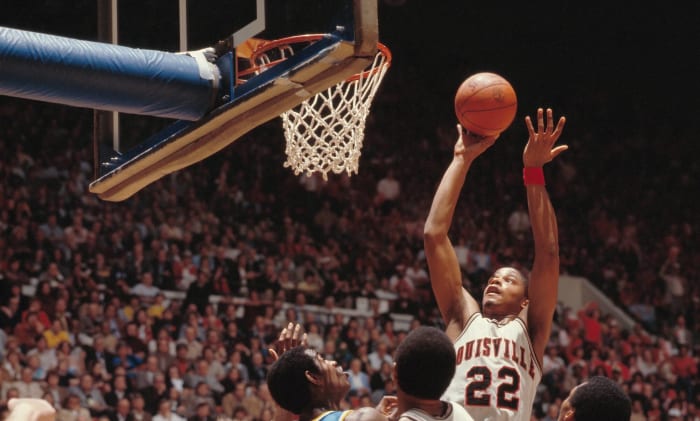
McCray is one of four Louisville basketball players to record more than 1,000 points (1,247) and 1,000 rebounds (1,029). He was a freshman starter on the Cardinals' 1980 national championship squad, averaging a modest 7.8 points — but shooting 54.3 percent — and 7.5 boards and 2.0 assists. In fact, McCray didn't average double-digit points for his career, but put in 11 per game while pulling down 8.4 rebounds and dishing out 3.4 assists as a senior in 1982-83, when he was named Metro Conference Player of the Year. McCray started 132 consecutive college games and also helped Louisville reach the Final Four in 1982 and '83.
Milt Wagner, Guard (1982-86)
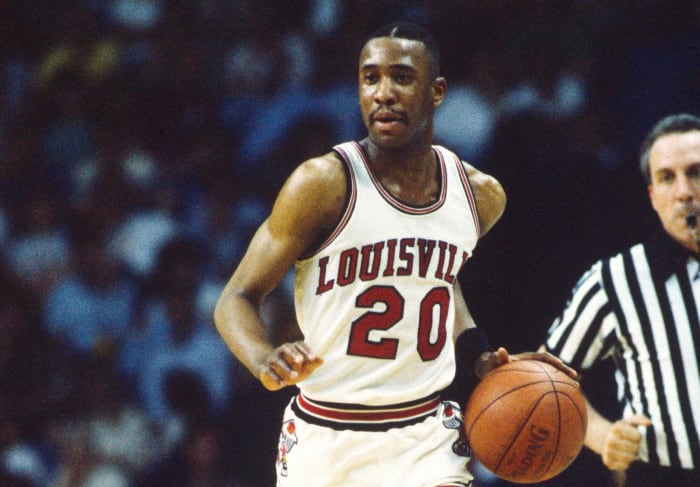
If it seemed like Wagner played forever at Louisville, it only felt that way. Wagner did spend five seasons with the Cardinals, though his initial senior season of 1984-85 was limited to just two games due to a broken foot. One of the great scorers in Louisville history, Wagner ranks sixth in program history with 1,836 points. He shot exactly 50 percent for his career, which featured 144 games (second-most among all Cardinals). Returning from injury, Wagner averaged 14.8 points and 4.2 assists during Louisville's run to the 1986 national championship. For his career, the two-time All-Metro Conference first-team selection ranks ninth in school history for assists (432) and eighth in free-throw percentage (81.4).
Billy Thompson, Forward (1983-86)
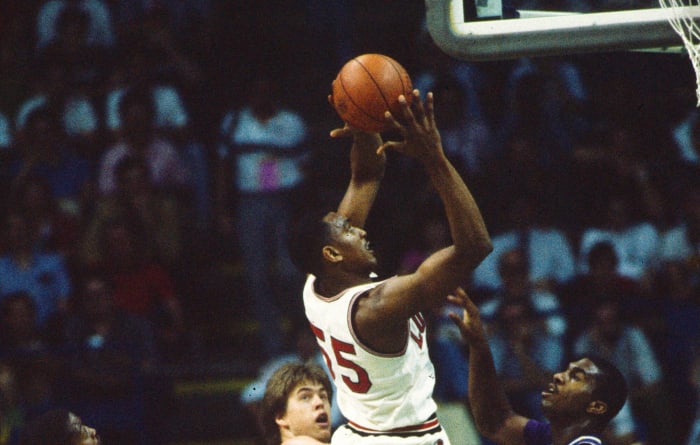
We continue the string of standouts from the Cardinals' 1986 national title squad. In fact, Thompson led that team at 14.9 points per game, one season after he averaged career highs for points (15.1), rebounds (8.4) and assists (4.2). Entering the 2022-23 season, Thompson is the only Louisville player to rank among the top 11 in career scoring (1,685 points), rebounding (928) and assists (459). He's also fifth among all Cardinals with 185 blocks. The two-time, first-team All-Metro Conference pick shot 52.8 percent for his collegiate career, which spanned 143 games over four seasons.
Herbert Crook, Guard-Forward (1985-88)
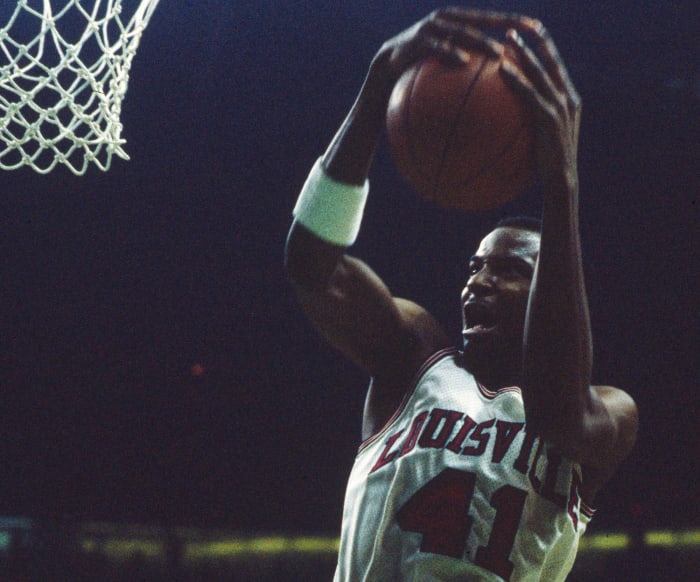
Out of Eastern High School in Louisville, Crook might be the most underrated star in Cardinals' history. He posted 10 points, 12 rebounds and five assists during Louisville's 72-69 victory over Duke in the '86 title game as a sophomore. Then he only got better from there, averaging 15.5 points and a career-high 8.0 rebounds the next season, when he was named Metro Conference Player of the Year. He then set a personal best with a 16.1-points average as a senior in 1987-88. Crook ranks 10th in school history for points (1,723), seventh in made field goals (656) and 11th in rebounds (877).
Pervis Ellison, Center (1986-89)
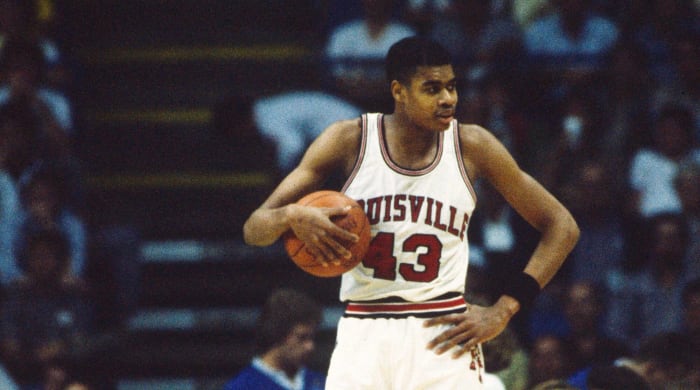
Right up there with Wes Unseld and Darrell Griffith when discussing the greatest of all time to play basketball at Louisville. From the get-go, the 6-foot-9 Ellison was destined to be a collegiate star. He proved that by totaling 25 points, 11 rebounds and two blocks during Louisville's upset win over Duke in the '86 final — and earning Most Outstanding Player honors in the process. To this day, Ellison is the only player in Cardinals history to post at least 2,000 points (third with 2,143) and 1,000 rebounds (third with 1,149) — while starting 135 of 136 games. He's also the school's all-time leader with 374 blocked shots. A three-time, first-team All-Metro Conference performer, the league's co-player of the year in 1988 and a consensus first-team All-American in '89, Ellison's No. 42 was retired by the school.
LaBradford Smith, Guard (1988-91)
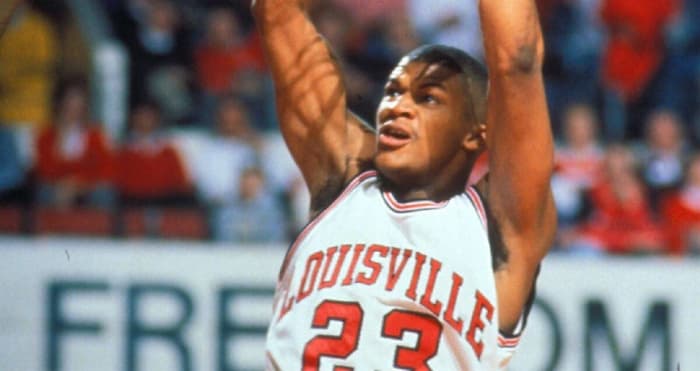
One of the most exciting players in Louisville history, Smith started all 133 games over four years played in college. The school's all-time assists leader (713), Smith never averaged fewer than 11.9 points in any of those seasons, shot 48.1 percent for his career and those 1,806 points rank eighth all time. Smith's 491 made free throws are the most among all Cardinals, and his 86.6-percent shooting from the stripe sits second in school history. An All-Metro Conference first-team selection in 1990, Smith also ranks fourth with 227 career steals.
Clifford Rozier, Center (1993-94)
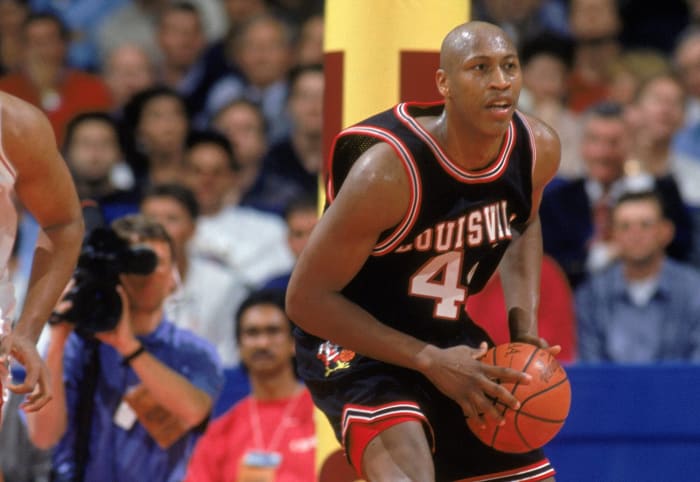
Rozier's collegiate career at Louisville lasted just two seasons after he transferred from North Carolina. A powerful force, Rozier averaged 15.7 points and 10.9 rebounds in his first season with the Cardinals in 1992-93, and 18.1 and 11.1 boards during that final campaign (when he was a consensus All-American selection), earning him Metro Conference Player of the Year in both 1993 and '94. Rozier's 17.0 points-per-game average ranks seventh in school history, while his 11.0 boards per contest for a career is sixth all time by any Cardinals player.
DeJuan Wheat, Guard (1994-97)
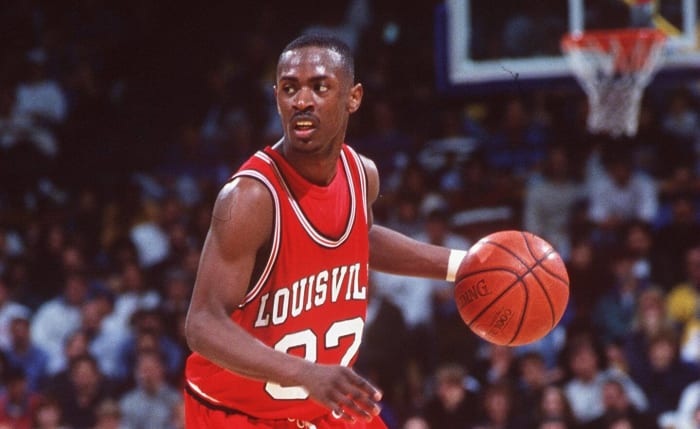
A pure scorer, Wheat ranks second on Louisville's all-time points list with 2,183, joining Darrell Griffith and Pervis Ellison as the only Cardinals to reach 2,000. That said, there was so much more to Wheat's overall game. He ranks second in school history with 323 made 3-pointers, is fifth with 498 assists and eighth in steals at 204, thus making the two-time, first-team All-Conference USA pick the first player in NCAA history to record at least 2,000 points, 450 assists, 300 made 3s and 200 steals. Wheat's 136 career starts and 4,560 minutes are also the most of any Louisville player.
Reece Gaines, Guard (2000-03)
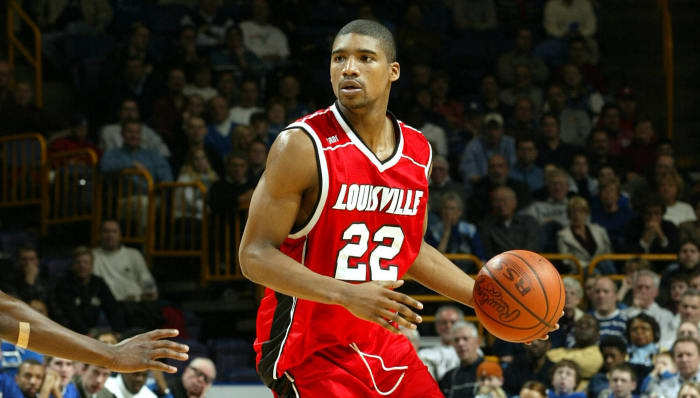
It's easy for Gaines to get lost amid all the individual greatness that's come out of Louisville through the decades. He's one of the program's all-time great shooters, ranking fourth in career points with 1,945, and among the top 15 averaging 15.6 per contest. A 45.2-percent shooter during a four-year career in which he started 123 of 125 games, the two-time, All-Conference USA first-teamer is third on Louisville's made 3-point field-goal's list (225) and 11th while shooting 38.3 percent from distance for his career. Gaines also ranks seventh in career assists (475) and 10th in steals (192).
Terrence Williams, Forward (2006-09)
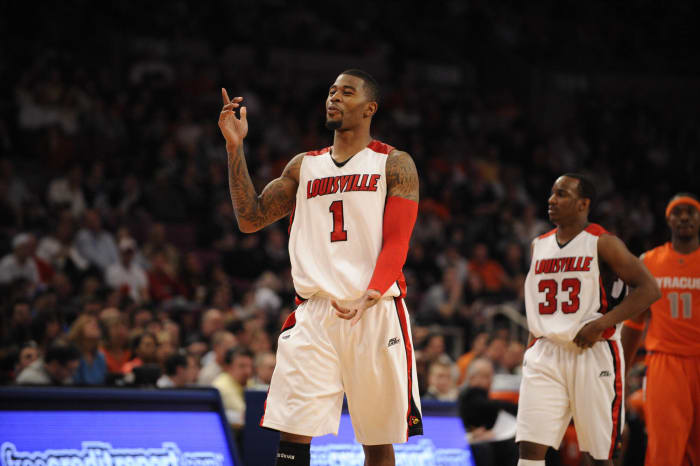
Perhaps the best pure athlete on this list. Williams did a little bit of everything during his stellar four-year Louisville career. He's among the school's top-20 scorers with 1,565 points, and sits within the Cardinals' top 10 in rebounds (970), assists (546) and steals (210). Williams also recorded 90 blocks during his career, which included some All-American recognition during his senior season of 2008-09. That's when he posted career bests for average points (12.5), rebounds (8.6), assists (5.0) and steals (2.3).
Peyton Siva, Guard (2012-13)
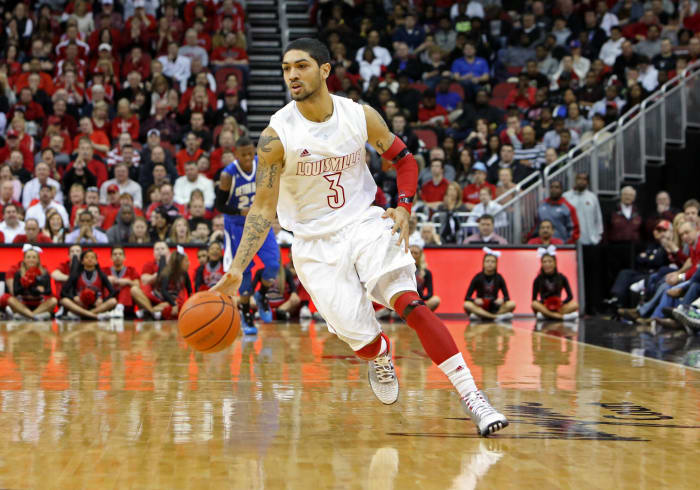
Though the infamous escort sex scandal forced the school to vacate its victories from 2011-'4, which included the 2012 trip to the Final Four and the 2013 national championship, Siva's impact on the court remains a major part of program's legacy. Only once did Siva average double-digit scoring for a season, but he was an undisputed leader, who played 144 games in four college seasons, and did break out with 18 points, six rebounds, five assists and four steals during the Cardinals' national-title win over Michigan. His 677 assists and 254 steals are both the second-most for a career at Louisville, where he was twice named Big East tournament MVP.
Russ Smith, Guard (2011-14)
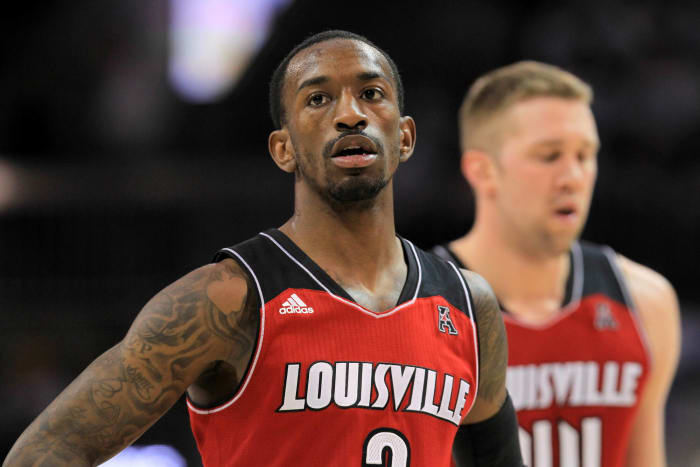
As a freshman, Smith played just 17 games due to various injuries. By the time his Louisville career ended, however, Smith was among the school's basketball legends. He ranks fifth in school history with 1,908 points, second with 488 career-made free throws and his 180 made 3-pointers are tied for 10th among all Cardinals. Smith, the school's all-time steals leader with 257, was a key part of those Final Four teams in 2012 and '13, and a consensus first-team All-American in 2013-14. Smith's No. 2 was retired by the school.
A Chicago native, Jeff Mezydlo has professionally written about sports, entertainment and pop culture for nearly 30 years. If he could do it again, he'd attend Degrassi Junior High, Ampipe High and Grand Lakes University.
More must-reads:
- John Calipari recruiting another top player from Kentucky
- Former All-Star shares concerns of potential Knicks burnout
- The 'Leading scorers from the 1992-93 NBA season' quiz
Breaking News
Customize Your Newsletter
 +
+
Get the latest news and rumors, customized to your favorite sports and teams. Emailed daily. Always free!
Use of this website (including any and all parts and
components) constitutes your acceptance of these
Terms of Service and Privacy Policy.

